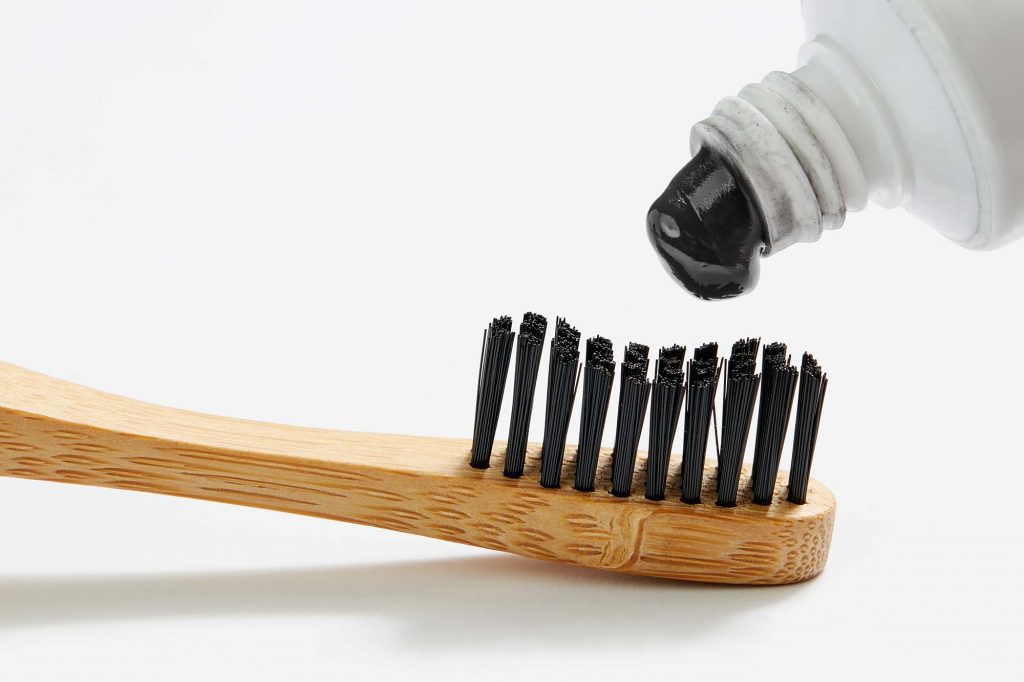Social media is full of advertisements and endorsements for charcoal toothpaste: the latest tooth-whitening miracle product! You can barely open Instagram or read a Buzzfeed list without seeing someone recommend the wonders of charcoal for your face and teeth. Some even use it as a rinse for your hair!
Likely due to a rise in popularity of “all-natural” products, charcoal has grown to be one of the most popular trends in dental hygiene. At first, it seemed to be just the influencers and paid sponsors doing the promotion, but now even major toothpaste companies are trying to cash in. Crest and Colgate have their own lines of charcoal toothpaste for sale currently.
The claims about charcoal toothpaste include not just teeth whitening but also remineralization and reduction of tooth decay. Is there any truth in these claims or is it simply snake oil?
What Exactly Is Activated Charcoal?
Most of us are only familiar with charcoal as it pertains to grilling hotdogs or hamburgers. But the kind of charcoal people are putting on their faces and toothbrushes is a different form called activated charcoal.
Activated charcoal is a powder made from natural materials. Activated charcoal is a manufactured product; it is not a naturally occurring substance. It can be made from wood, coconut, and coal. When these materials are placed under high heat, they become ‘oxidized’ and turn into activated charcoal. It is not the same as the charcoal briquettes you buy for grilling, and you should never use those for any cosmetic purposes.
What Does Activated Charcoal Supposedly Do?
This material has been around for centuries and used for various purposes. It gained popularity in the 19th century as a treatment for poison and has saved countless lives since then.
Activated charcoal is known to be highly absorbent. Because of this, it is often used by medical professionals to treat patients who have ingested toxins or poison. It can even be used in cases of a drug overdose. This same absorbent property is also the reason given for its supposed teeth-cleaning abilities.
The claims about activated charcoal are pretty widespread and deal with pregnancy, gas, cholesterol, and even hangovers. However, there is little evidence to support most of the claims. Proponents of charcoal toothpaste claim that it can latch on to the bacteria, plaque, and food residue on your teeth. This supposedly leads to a brighter smile and a healthier mouth.
What Do Dentists Say About Activated Charcoal?
Dentists seem to be in agreement that the evidence for charcoal toothpaste is still lacking. A 2017 study reviewed the available literature and found that claims of the efficacy and safety of charcoal toothpaste are insufficient. The authors of that study advised other dentists and healthcare professionals to caution their patients against the use of charcoal toothpaste without additional evidence-based support.
Aside from the lack of evidence for its benefits, many dentists also warn about some known risks. Charcoal, even as a fine powder, is likely too rough and abrasive for tooth enamel. If used, it should not be daily.
Reducing tooth enamel can have serious consequences for overall tooth strength and sensitivity. It could also result in stained teeth instead of whiter ones.
Charcoal pieces can become embedded between teeth and cause plaque build-up. This is especially risky for older individuals who are already at risk for weakened teeth. A buildup of any material in your teeth can have ramifications down the line.
Another potential risk of charcoal toothpaste is that you may miss out on the benefits of regular toothpaste. Unless they are commercially produced and contain accurate descriptions of their ingredients and uses, you might not be sure of their contents.
Charcoal toothpaste may not contain some of the elements of toothpaste that work to prevent tooth decay. Specifically, many of them have been found to lack flouride, which is a key tool in preventing tooth decay. Flouride may be left out because it coats the teeth and may interfere with tooth-whitening.
Make sure that you are fully aware of the ingredients, contents, and risks of any oral health products you plan to purchase.
Something else that dentists, orthodontists, and patients should keep in mind are the impacts of charcoal products on dental restorations, such as fillings and veneers, and orthodontic treatments like braces. They may become permanently stained or damaged through abrasion.
The Bottom Line
Ultimately, we still have much to learn about charcoal toothpaste. Many users swear by its whitening properties, and the commercial manufacturers have gotten on board as well. But the existing evidence all points toward caution.
Charcoal is known to be potentially damaging to teeth if used long-term, and there has been no conclusive evidence that it provides any actual benefit for oral health. In fact, using a toothpaste that has not been approved by the ADA and does not contain fluoride could be a significant tooth brushing mistake that could damage your oral health long-term.
Damage caused by weakened enamel and tooth decay could end up costing you greatly in the future. These costs might exceed the cost of professional tooth whitening and be painful on top of it. It might not be wise to take shortcuts for your oral health when evidence-based procedures are available and often affordable.
Although charcoal products are currently a hot topic and get most of the attention, they do not work better than the other existing methods. If you are looking to whiten your teeth, you are best served by other products.
There are over-the-counter products, such as commercial teeth-whitening strips, that have been endorsed by the American Dental Association, and you can even have your teeth professionally whitened in your dentist’s office. These options have all been proven to be safe and are a more reliable option than charcoal.
Before using any products for oral health or oral aesthetics, make sure to consult with your dentist or orthodontist. They will have your teeth’ best interest at heart and help steer you in the right direction.



